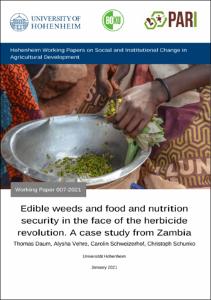Daum, Thomas; Vehre, Alysha; Schweizerhof, Carolin; Schunko, Christoph: Edible weeds and food and nutrition security in the face of the herbicide revolution : A case study from Zambia. Hohenheim: University of Hohenheim, 2021. In: Hohenheim Working Papers on Social and Institutional Change in Agricultural Development, 007-2021.
Online-Ausgabe in bonndoc: https://hdl.handle.net/20.500.11811/10886
Online-Ausgabe in bonndoc: https://hdl.handle.net/20.500.11811/10886
@techreport{handle:20.500.11811/10886,
author = {{Thomas Daum} and {Alysha Vehre} and {Carolin Schweizerhof} and {Christoph Schunko}},
title = {Edible weeds and food and nutrition security in the face of the herbicide revolution : A case study from Zambia},
publisher = {University of Hohenheim},
year = 2021,
month = jan,
series = {Hohenheim Working Papers on Social and Institutional Change in Agricultural Development},
volume = 007-2021,
note = {Herbicides are on the rise across the developing world. Herbicides may come with several advantages, for example, they may help to improve yields, thereby contributing to food and nutrition security. However, they may negatively affect environmental and human health. In the quest to assess the trade-offs of herbicide use, one aspect has received limited scientific attention: the role of edible weeds, which can be key elements of rural food baskets, yet are also the targets that herbicides are designed to eradicate. Using a quantitative survey with 158 households and a range of qualitative methods such as field walks, focus group discussions, and stakeholder interviews, this study examines the role of edible weeds for rural diets in Zambia and explores how herbicides affect the consumption of edible weeds. The results suggest that edible weeds are an integral part of rural diets in Zambia, in particular during the “hunger months”, emphasizing their contribution to food and nutrition security. While the unfolding herbicide revolution poses risks to the availability of edible weeds, herbicide use did not (yet) affect the consumption of edible weeds, likely because still few households use herbicides, and herbicides are sprayed only on a fraction of the plots. Long-term herbicide users are, however, slightly less likely to consume edible weeds. Given the potential trade-offs between herbicides, edible weeds, and food security, this topic should continue to be monitored. Policymakers should pay more attention to potential trade-offs concerning food and nutrition security when promoting the use of herbicides.},
url = {https://hdl.handle.net/20.500.11811/10886}
}
author = {{Thomas Daum} and {Alysha Vehre} and {Carolin Schweizerhof} and {Christoph Schunko}},
title = {Edible weeds and food and nutrition security in the face of the herbicide revolution : A case study from Zambia},
publisher = {University of Hohenheim},
year = 2021,
month = jan,
series = {Hohenheim Working Papers on Social and Institutional Change in Agricultural Development},
volume = 007-2021,
note = {Herbicides are on the rise across the developing world. Herbicides may come with several advantages, for example, they may help to improve yields, thereby contributing to food and nutrition security. However, they may negatively affect environmental and human health. In the quest to assess the trade-offs of herbicide use, one aspect has received limited scientific attention: the role of edible weeds, which can be key elements of rural food baskets, yet are also the targets that herbicides are designed to eradicate. Using a quantitative survey with 158 households and a range of qualitative methods such as field walks, focus group discussions, and stakeholder interviews, this study examines the role of edible weeds for rural diets in Zambia and explores how herbicides affect the consumption of edible weeds. The results suggest that edible weeds are an integral part of rural diets in Zambia, in particular during the “hunger months”, emphasizing their contribution to food and nutrition security. While the unfolding herbicide revolution poses risks to the availability of edible weeds, herbicide use did not (yet) affect the consumption of edible weeds, likely because still few households use herbicides, and herbicides are sprayed only on a fraction of the plots. Long-term herbicide users are, however, slightly less likely to consume edible weeds. Given the potential trade-offs between herbicides, edible weeds, and food security, this topic should continue to be monitored. Policymakers should pay more attention to potential trade-offs concerning food and nutrition security when promoting the use of herbicides.},
url = {https://hdl.handle.net/20.500.11811/10886}
}






